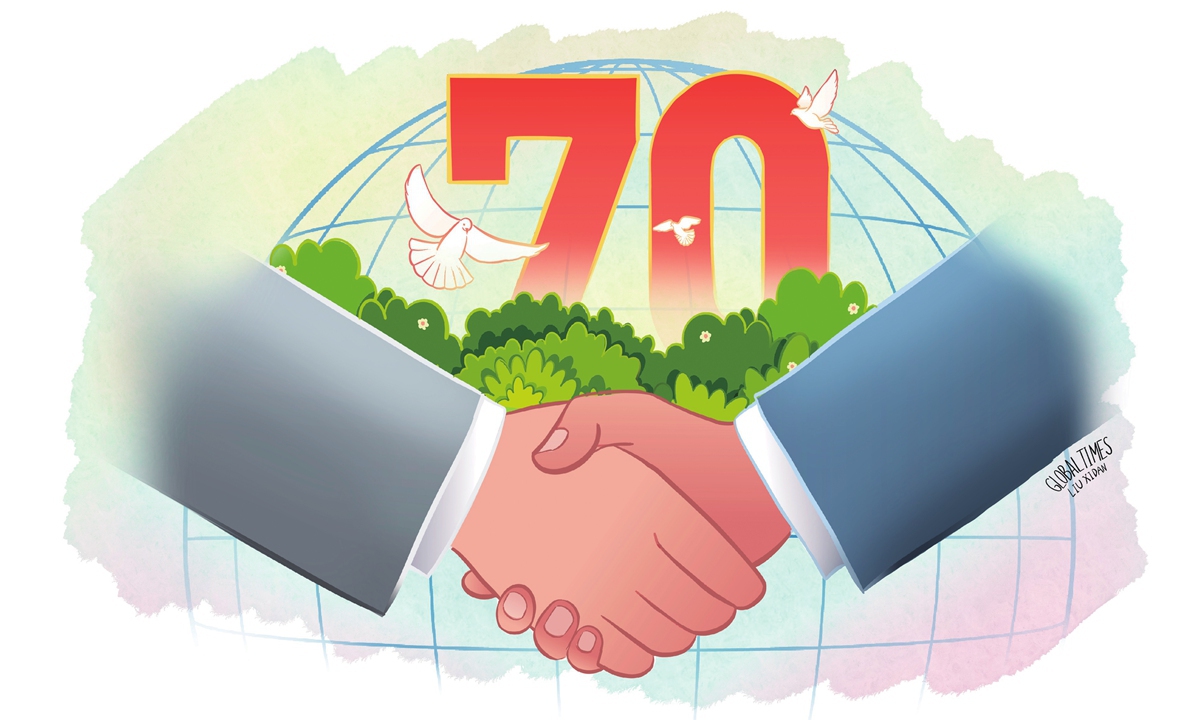
Illustration: Liu Rui/GT
Editor's Note:
Seventy years ago, representatives from 29 Asian and African countries gathered in Bandung, Indonesia from April 18 to 24 for the historic Bandung Conference. The meeting laid the foundation for what became known as the Bandung Spirit, which continues to shape the identity and aspirations of the Global South today.
To commemorate the 70th anniversary of the Bandung Conference, the National Institute of International Strategy and the Institute of West-Asian and African Studies of the Chinese Academy of Social Sciences co-hosted an international academic conference on Tuesday. At the event, the Global Times collected insights from scholars and experts to explore how the Bandung Spirit still resonates across today's Global South.
Djauhari Oratmangun, ambassador of the Republic of Indonesia to China and Mongolia
Seventy years ago, leaders from 29 Asian and African nations gathered in Bandung, to reject colonialism, champion self-determination and declare that no nation, no matter how small, should be left behind. They did not just call for change; they demanded a new, more just world order.
In our contemporary world, the challenges that confront us are complex and multifaceted. Protectionism is on the rise, geopolitical divisions are deepening and economic uncertainties threaten to unravel the structures that were designed to promote fairness and stability. These modern-day trials compel us to ask: Do we allow history to repeat the mistakes of the past, or do we boldly reclaim and reinvigorate the noble ideals that were conceived in Bandung? The answer lies in unity and resolute action. Indonesia and China, both pivotal players in the Global South, stand at a crossroads where the legacies of our shared history and the imperatives of the future converge.
We must advocate for a global order where development is not the privilege of a select few, but a right enjoyed by all. We need a system that prizes inclusive growth and upholds the dignity and prosperity of every nation and its people.
We must embark on several key initiatives: First, let us strengthen infrastructure connectivity and promote digital transformation across all regions. Second, enhancing food and energy security remains paramount. Third, there is an urgent need to reform global governance structures and financial institutions to reflect the shifting balance of power and ensure fairer participation by all nations.
The Asian-African Conference is not just a memory, it is our responsibility. China and Indonesia can serve as bridges between developing regions, sharing experience and innovation while fostering a more just world order.
Endalkachew Sime, former state minister of the Planning and Development Commission of Ethiopia
The most important lesson from the Bandung Conference is that the Global South is once again being reminded to stand together during these turbulent times. This season is a time for us to reflect on our unity as players in the Global South. The Bandung Conference serves as a reminder of how we can pursue a better form of multilateralism, one that benefits people across the globe. That, I believe, is the major message to take away from this gathering.
Global growth opportunities are increasingly emerging in the Global South. Africa is the youngest continent. The economic cooperation between China and Africa, when examined in detail, reveals that the future lies with the Global South. This is an important lesson for the rest of the world: to cooperate with the Global South in building a common future.
The rise of the Global South should not be seen as a competition. Instead, it is a complementary cooperation. The Global South and Global North either swim together or sink together. The unidirectional path we've followed for many years is no longer viable. The Global South is more than ready to cooperate with the Global North - and the Global North also has to be prepared to cooperate with the Global South. That is the only way we can jointly shape a shared destiny and a common future.
Looking to the future, the Bandung Conference laid the foundation for South-South Cooperation. In the last several years especially, through the Belt and Road Initiative, we've witnessed numerous successes in countries across Africa and the Global South. We must draw lessons from the past decade and work to maximize the economic benefits and comparative advantages of this cooperation - especially in serving the poor and creating a better life for our citizens through Global South partnerships.
Muhammad Abdurrohim, research coordinator of the ASEAN-China Research Center of the University of Indonesia
In today's world, the cooperation among Global South countries reflects a growing strength. I believe this cooperation is essential for shaping a more balanced international order. The Global South must continue to grow stronger - independent of pressure or uncertainty imposed by the Global North. I am confident that the Global South possesses the power and potential to do so.
The Bandung Spirit proves that the Global South has the ability to express a collective voice among developing nations. It offers a compelling platform to promote an alternative international order - one that reflects the aspirations and perspectives of the developing world. As the existing global order led by the US and other traditional powers appears increasingly unstable, the Bandung Spirit serves as a vital reminder that the Global South can and should advocate for a more inclusive and equitable system.
A community with a shared future for mankind is an extension of the Bandung Spirit. Both frameworks highlight the importance of allowing developing countries to determine their own development paths. Both of them emphasize that every developing country has the right to chart its own course, free from external domination.
China plays a crucial role in promoting development and cooperation among Global South countries. It serves as a powerful example of how South-South Cooperation can be effectively pursued. China's model shows how strategic cooperation and effective economic policies can be combined to ensure the well-being of a nation's people. For countries still grappling with poverty, this is perhaps the most vital lesson of all.
Abdilahi Ismail Abdilahi, professor of the School of African Studies of Beijing Foreign Studies University
In my view, South-South Cooperation has been steadily expanding year by year. We are witnessing a continuous increase in collaborative efforts, particularly between China and Africa. As an African, I believe this form of partnership brings substantial benefits to our continent.
One of the key topics I wish to highlight today is the concept of a "China-Africa community with a shared future," which I see as a natural continuation of the Bandung Spirit. Moreover, the African Union's Agenda 2063, which envisions a prosperous and integrated continent, has received strong support from China in its implementation. Today, many young Africans benefit from training programs, scholarships and academic opportunities in China - a truly valuable contribution to Africa's development.
Through our collaboration with China, we are gaining critical knowledge, practical skills and development experiences. This is especially meaningful for African countries, where young people are eager to learn from China's success and to apply those lessons at home. We grow, we progress and we thrive.
As a young scholar, I am hopeful that this cooperation will continue to deepen. African nations in particular stand to benefit greatly from China's development experience - especially in areas such as poverty reduction. Today, many African students are studying in China to explore effective strategies for lifting people out of poverty and creating more opportunities for our youth.
This is my vision for the future: to strengthen our ties with China and to further enhance South-South Cooperation for the mutual benefit of our peoples.


